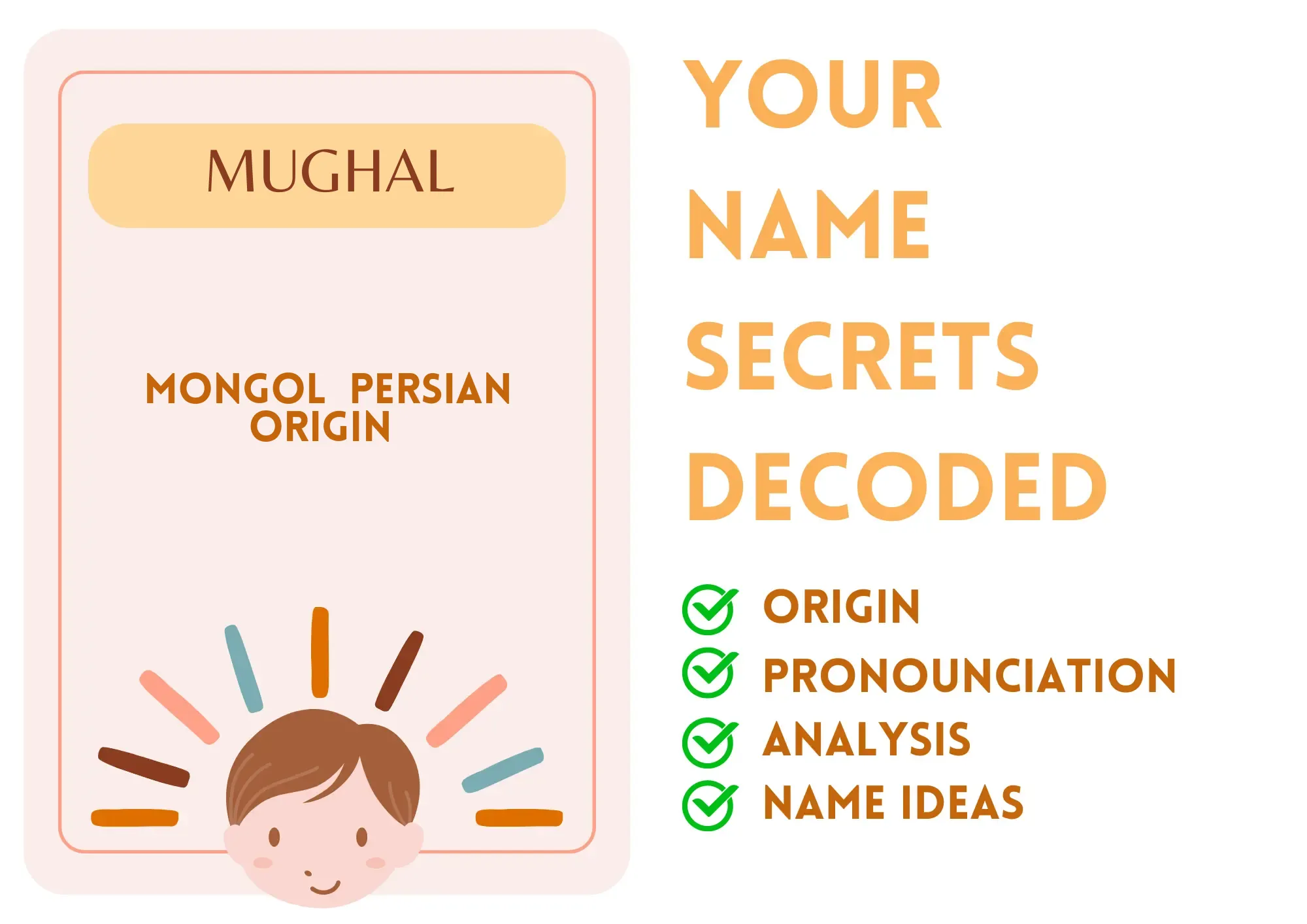
Mughal
Mughal is a distinctive name derived from the Persian word for 'Mongol.' It historically refers to the Mughal Empire, a prominent and influential dynasty that ruled over much of the Indian subcontinent from the early 16th to the 19th century. The name is compatible with both genders but is more often encountered as a masculine name. Its usage as a name today symbolizes power, elegance, and a rich cultural heritage associated with a significant historical period.
The name is often perceived as noble and carries a certain gravitas, thanks to the grandeur and legacy of the Mughal Empire. Despite its historical connections, the name is easy to write and pronounce, which adds to its appeal.
In contemporary culture, 'Mughal' surfaces in literature, films, and art, often depicting themes of royalty, romance, and historical significance. It elicits feelings of respect and fascination, while also reminding one of a colorful past.
Basic Information
Gender: Boy
Sounds Like: MOO-gahl
Pronunciation Explanation: The first syllable 'MOO' is pronounced as in 'moo' (the sound a cow makes), and the second syllable 'gahl' is pronounced to rhyme with 'pal'.
Summary and Meaning
Meaning: Mongol (Persian origin)
Origin: The name Mughal has Persian origins, commonly linked to the Mongol ethnicity associated with the Mughal Empire in India.
Usage: Mughal is traditionally a masculine name, often associated with strength and dignity, though it can be used unisex.
Name Number (Chaldean)
Name Number (Pythagorean)
Popularity (Global Rank)
Overall: 36736
Boys: 72681
Most Popular in
Religious and Cultural Significance
Religion: Islam
Background: The name Mughal is often connected to the historical Muslim rulers of India, including the famous emperors of the Mughal Empire, who followed Islam.
Cultural Significance: Mughal signifies a blend of Persian and Indian cultures, representing the confluence of artistry, architecture, and rich history of the Mughal Empire.
Historical Significance: The Mughal Empire represents a pivotal period in Indian history, known for its advances in culture, architecture, and the arts. Figures like Akbar, Shah Jahan, and Aurangzeb remain significant historical icons.
Popular Culture
Literature and Mythology: The Mughal Empire is frequently referenced in historical novels and studies, showcasing its grandeur and complex society.
Movies and Television: Film and television often depict Mughal characters in storylines highlighting courtly life, power struggles, and romance, such as in the film 'Jodhaa Akbar'.
Feelings and Perceptions
Perception: Mughal is viewed positively, often evoking images of nobility and rich history. It signifies strength and elegance, making it a respected name.
Positive Feelings: Majestic, powerful, historical, cultural, refined.
Negative Feelings: Some may find it overly historical or complicated, possibly lacking modern appeal.
Practical Considerations
Ease of Writing and Calling: Mughal is relatively easy to write and pronounce, consisting of six letters and two syllables, though some may stumble on the pronunciation initially.
Common Typos and Misspellings: Mughhal,Mughal,Mughal,Mughaal
Common Nicknames: Mugu,Ghal,Mu
Mughal Popularity
Mughal Usage and Popularity By Country
| Country | Rank (Overall) |
|---|---|
| Pakistan | 1086 |
| Saudi Arabia | 6306 |
| United Arab Emirates | 7988 |
| Japan | 8940 |
| Bahrain | 9628 |
| Belgium | 18286 |
| Qatar | 21780 |
| Italy | 22161 |
| Bangladesh | 23062 |
| Ireland | 23749 |
Mughal Usage and Popularity By City
| City | Rank (Overall) |
|---|---|
| Lahore | 996 |
| Peshawar | 737 |
| Rawalpindi | 1015 |
| Delhi | 13804 |
| HyderÄbÄd | 22725 |
| Bombay | 25939 |
| Umaria | 46 |
| Srīnagar | 1577 |
| Jaipur | 7199 |
| Antwerp | 6616 |
Compatibility Analysis
Famous Persons Named Mughal
No results found for Mughal.
Related Names
Similar Sounding Names:
Mughil,Maghal,Mahhal